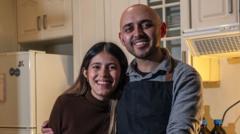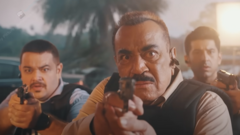"It all started as a small passion project," says Fabriccio Díaz, 28, who, along with his wife Lucía Ramírez, 25, operates the Arca Film Lab, the only fully functional photo film development lab in Central America, right from their apartment in Guatemala City. "Now we have over 60 clients a month and have developed over 800 rolls just this year," he adds.
Arca Film Lab has seen a surge in demand this year and is the sole facility in the region capable of developing all kinds of analogue photography film, including the intricate E-6 process for positives. Fabriccio, with a background in cinematography, found motivation in the lack of accessible, high-quality film development services in Central America, leading him to learn film development.
"When we began experimenting and developing film at home, our friends asked us to develop theirs, and before we knew it, it just took off," Lucía remembers. Thus, the Arca Film Lab was born in September 2023 as a straightforward Instagram page offering development services in Guatemala.
The couple learned most of their skills from online tutorials and by connecting with international film labs for guidance. "We were amazed by how many veterans from the photo development world offered their support and shared their expertise," says Fabriccio. Their enthusiasm extends beyond film processing; they also organize "photo walks" in Antigua, where enthusiasts gather to capture images using vintage analogue cameras.
For young photographers like Iván Ortiz, 22, using a camera that predates him offers a unique satisfaction that modern digital devices lack. "It's like having nostalgia for a time we never experienced," he explains, noting that many older individuals struggle to grasp the allure of old cameras. "In a digital world, analogue photography forces me to make deliberate choices and focus on the process, resulting in tangible photos instead of mere digital files," he adds.
Steven López, a 33-year-old traveler from the US documenting Mayan culture, reflects on the benefits of analogue photography. "It's the best way to experience and document cultures. When the developed film comes back, it's like Christmas every time!" he tells us.
Although the analogue photography community in Central America is expanding, challenges persist. Ronald Ottoniel, 26, points out the difficulty in obtaining analogue cameras and keeping them in optimal condition. Fabriccio and Lucía explain the hurdles of procuring and importing chemicals for positive film development, which are closely regulated and require special permits, making the process laborious.
Despite their growing business, Fabriccio and Lucía are committed to maintaining the personal touch that sparked their journey. "Sometimes clients include little treats in their packages, and we reciprocate with handwritten notes," Lucía shares. For them, it's essential that every client feels valued and regarded as an individual.
While many photo labs rely on automated machines, the couple embraces a hands-on approach in their modest apartment. Precise control of temperature and timing during the development process is crucial; leaking even once can ruin a whole film roll. "The beginning was tough, but now developing over 800 rolls has made this second nature for us," Fabriccio recalls.
Their spirited cat Toto, just four months old, has become an essential part of the team, overseeing quality control during development. Once developed, film rolls are suspended to dry in the most dust-free area of their home before being scanned with Central America’s highest-resolution scanner.
Having recently expanded to El Salvador for film collection and sales, the ambitious couple envisions a future partnership with CineStill and Eastman Kodak. "My dream is to revitalize classical cinematography here in Central America! We've got a wealth of talent, expertise, and zeal to share with the world," declares Fabriccio. Through Arca Film Lab, they are nurturing a movement that they aim to push forward relentlessly.









